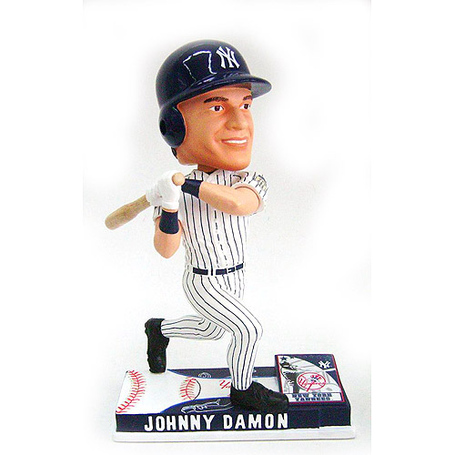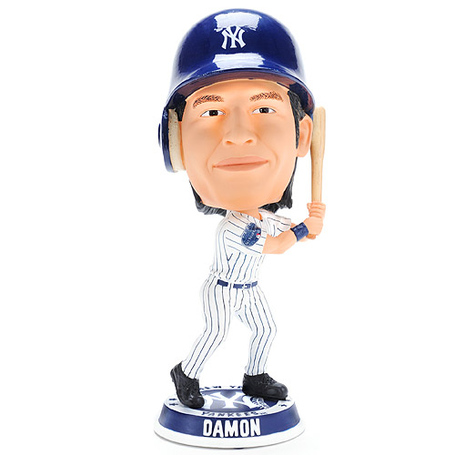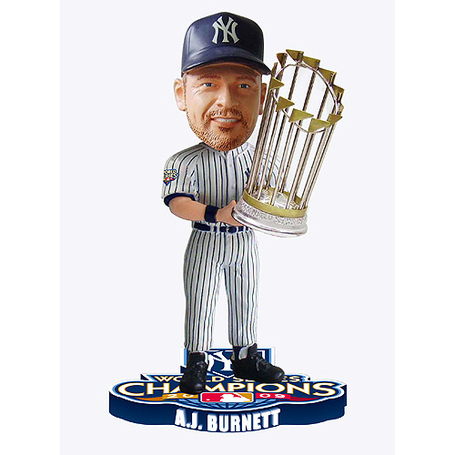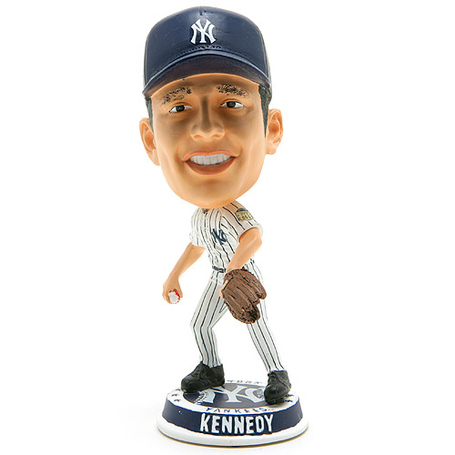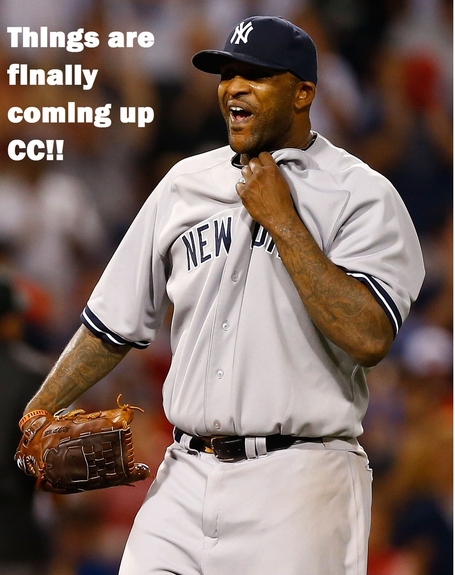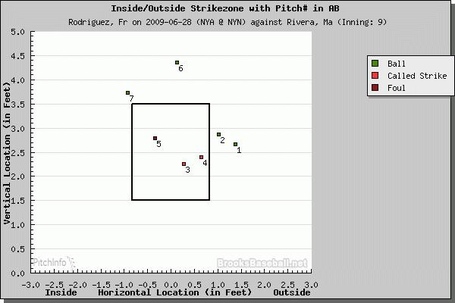![]()
Andy Pettitte is the second-best pitcher in Yankees history and one of the best lefties of his generation, but while there have been many great moments throughout his 18-year career, there have been several disappointing ones as well. If you'd prefer to only remember the good times, feel free to skip this list entirely; there will be a much more fun top ten greatest Pettitte moments list soon. For now though, here are Pettitte's worst ten moments.
10. Outdueled by Beckett
2003 World Series Game 6 vs. Marlins
This game barely reaches the list since Pettitte actually pitched pretty well in the final game of the 2003 World Series. It actually ranks as his 12th-best playoff performance out of 44 games by Game Score: seven innings of two-run ball at Yankee Stadium with six hits, three walks, and seven strikeouts against the Florida Marlins. However, it was not good enough to beat the Fish that day, and Pettitte himself would probably chalk it up as a disappointment since the Yankees needed him to win to stay alive in the series.
The Yankees entered Game 6 in a must-win scenario, having blown their 2-1 series lead thanks to Jeff Weaver pitching meaningful innings over Mariano Rivera in the extra inning Game 4 loss (thanks, Joe Torre) and a miserable bullpen implosion in Game 5 after David Wells left in the second inning due to a back injury. The Yankees held home field advantage though, so if they could just win the two games in Yankee Stadium, they would be World Series champions anyway. Marlins manager elected to go with 23-year-old ace Josh Beckett on three days' rest over Mark Redmond, who struggled in Game 2. Beckett suffered a tough loss in Game 3 thanks to a late rally, but he had dominated everyone not named Derek Jeter in the Yankees' lineup. Pettitte pitched for the Yankees after having nearly shut out the Marlins in Game 2. If he could beat Beckett, then the Yankees would have Mike Mussina pitching in Game 7 against either Redmond or Carl Pavano on three days' rest, a very favorable matchup.
Pettitte put baserunners on in three of the first four innings, but worked out of it until getting burned in the fifth. Alex Gonzalez, Juan Pierre, and Luis Castillo hit back-to-back-to-back two-out singles to give the Marlins a 1-0 lead (Gonzalez barely beat the throw home with a good slide around Jorge Posada, who received the ball on the first-base side of home plate). An inning later, Pettitte was betrayed by an unlikely source--his longtime teammate and Yankees captain Derek Jeter, who bobbled a grounder and threw low to first base, allowing Jeff Conine to reach to lead off the inning. Pettitte walked Mike Lowell, then made a mistake on a bunt by Derrek Lee back to the mound, oddly electing to try for the double play at second base rather than cutting down Conine at third; an accurate throw would have nailed him. They only got one out, and Juan Encarnacion brought Conine home with a sacrifice fly, an insurance run for Beckett.
Pettitte departed after the seventh to make way for a quick two-inning relief effort by Mariano Rivera, but the Yankees' powerful offense never managed anything against Beckett. They never had more than one baserunner on in any inning against Beckett, and they were shut out 2-0. The Marlins were World Series champions, and an opposing team celebrated at Yankee Stadium for the first time since 1981.
(Box score)
9. Career-worst regular season game
4/30/1996 vs. Orioles
Everyone has their duds, and Pettitte never had a worse game than this April outing against perhaps the best offense in Orioles history. Pettitte was actually a month into what would be a near-Cy Young Award-winning season, but he was absolutely atrocious this night at Camden Yards. The Yankees staked him to an early 2-0 lead when Jeter led off the game with an opposite-field single against then-starter Arthur Rhodes, and after Jim Leyritz flew out, Paul O'Neill followed with a monster two-run homer to Eutaw Street, 431 feet away.
Pettitte took the mound in the first and allowed a leadoff triple to Brady Anderson. He then walked Roberto Alomar, and Rafael Palmeiro brought Anderson home with a sacrifice fly. Pettitte got Bonny Bonilla to pop out to Tino Martinez at first; he was one out from escaping the inning with minimal damage. Cal Ripken Jr. hit a slow grounder to Leyritz, who played third base that day. Ripken beat it out and Leyritz threw the ball away, allowing Alomar to score and Ripken to move to second. B.J. Surhoff then scored Ripken on a single to make it 3-2, Orioles. Mike Devereaux grounded out to end it, but the Orioles had the lead.
The Yankees made up for the deficit by tallying two runs off Rhodes in the top of the second, though they squandered an opportunity for more when Tino struck out with the bases loaded and two outs. When Pettitte returned to the mound in the second inning, he had absolutely nothing. Leading off, catcher Chris Hoiles belted a solo homer to tie the score, and Jeffrey Hammonds followed with a single. Pettitte walked Anderson, Alomar beat out a bunt to load the bases, and Palmeiro gave the O's the lead with a line drive single to right. Bonilla then laced a pitch up the middle for a two-run single, pushing the score to 7-4 with still no one out.
That was enough for Torre, who replaced his struggling starter with righty Scott Kamieniecki. He immediately allowed a two-run double to Ripken though, finishing the disastrous line on Pettitte: one inning, eight hits, nine runs, two walks, no strikeouts, and a Game Score of exactly 1. Woof. Although they trailed by five, the Yankees actually came back and won the game, 13-10, setting a record at the time for the longest nine-inning game ever played, four hours and 21 minutes. It was a bad day for Pettitte, but the Yankees bailed him out.
(Box score)
8. A comebacker halts the comeback
6/27/2012 vs. Indians
In Spring Training 2012, Pettitte shocked baseball by announcing his return to the game after sitting out the 2011 season in apparent retirement. The year away from the game helped him heal, and he had the desire to give pitching another try. After a few outings in the minors, Pettitte returned to the Yankees on May 13th against the Mariners. He lost that start, but he was quite good in four of his next five games, notching an ERA of 2.77 in seven starts as he passed his 40th birthday.
Two starts later, Pettitte took on the Indians at Yankee Stadium. The Yankees gave him a 2-1 lead in the bottom of the fourth on a two-run double by Eric Chavez. Pettitte began the fifth inning facing struggling first baseman Casey Kotchman. The count went to 1-1, and then Kotchman smashed a low pitch back up the middle, right above Pettitte's ankle. It ricocheted slowly toward third base and Kotchman reached base, but the Yankees' concern was with Pettitte. He tried to shake it off, and he convinced manager Joe Girardi to let him stay in the game. After one pitch though, it was clear that Pettitte was not okay. He departed from the game and would not take the mound again for two and a half months--the line drive fractured his lower leg. It was a disappointing freak interruption to Pettitte's comeback, but there was nothing the Yankees could do.
[Aside: One could make a strong case that perhaps Pettitte's elbow problems in 2004, his first season with the Astros should have made their way onto this list too since they really derailed his year. It was the only season of Pettitte's career when he was on a playoff team but unable to pitch due to injury. A healthy Pettitte might have helped the Astros beat the Cardinals in the NLCS. I did not include it since I'd prefer to focus on Yankee moments, but it could just as easily have gone in this eighth slot as well.]
(Box score)
7. Road trip from hell in August '95
8/16-8/25/1995
Pettitte was not originally supposed to be in the 1995 Yankees' starting rotation, but injuries forced the rookie into action from bullpen duty, where he spent his first five games. Unlike many of his teammates, he stayed healthy throughout the season, made his first career playoff start, and finished third in AL Rookie of the Year voting. He earned his first win in a 6-1 victory over Oakland on June 7th, and in Pettitte's first 16 career starts, he pitched well considering the intense offensive environment (3.72 ERA in 101 1/3 innings). The Yankees were far behind the AL East-leading Red Sox by mid-August, but thanks to the addition of the Wild Card, they remained in the playoff hunt as they sought to finally send captain Don Mattingly the playoffs for the first time in his 14-year career.
After winning two games in a row against the eventual AL champion Indians on August 12th and 13th, the Yankees embarked on a 13-game road trip in Boston, Anaheim, Oakland, and Seattle. It was a complete disaster, as the Yankees went 3-10 and dropped from three games over .500 to four games under .500, four and a half games behind the Wild Card-leading Rangers. They lost eight games in a row at one point, and Pettitte unfortunately played a big role in three of the losses on the trip.
The Yankees actually hoped to take the first series of their road trip, as they split the first two games in Boston before handing the ball to Pettitte in the rubber game. The eventual division champions hit him hard though, as he gave up four runs on six hits in six innings, mostly due to a two-run triple by Mike Greenwell and a two RBI from Jose Canseco, who later homered over the Green Monster as well. The Yankees rallied from down 4-0 to tie it, but the bullpen blew the game in the eighth inning, and they lost 7-4.
In his next start against the under-.500 A's, Pettitte threw two wild pitches and didn't even make it out of the first inning; Oakland pummeled him for six runs on eight hits in 2/3 of an inning before future pitching coach Dave Eiland relieved him (Game Score of 14). Todd Stottlemyre threw a complete game and the Yankees lost a blowout, 13-4. They kept losing games and had dropped six in a row prior to Pettitte's next start, at Seattle's Kingdome. Closer John Wetteland blew the save and the game the night before in a three-run rally capped by a walk-off homer by Ken Griffey Jr., and the Mariners rode that momentum against Pettitte, who only made it through 2 2/3 innings. Edgar Martinez crushed a three-run homer in the third inning and the score was 6-2 when Showalter hooked Pettitte in favor of long reliever Mariano Rivera. The future bullpen ace pitched the final 5 1/3 innings, allowing just one run, but the Yankees lost, 7-2. Although it was an ugly stretch for Pettitte and the Yankees, they eventually recovered to win the Wild Card.
6. Cleveland rocks Pettitte, 1998 edition
1998 ALCS Game 3 vs. Indians
The 114-win '98 Yankees juggernaut rolled past the Rangers in a three-game ALDS sweep, then took the first game of the ALCS against the Indians behind David Wells, 7-2. They hoped to exact revenge on Cleveland for knocking them out of the '97 playoffs and send the defending AL champions home. The Yankees lost Game 2 in excruciating manner--they blew several scoring opportunities, and in extra innings, second baseman Chuck Knoblauch argued a call on a bunt up the first base line without realizing that Enrique Wilson was running around third base and stumbling toward home with the go-ahead run. The Tribe won 4-1, and they seized home field advantage as the series shifted from Yankee Stadium to Jacobs Field.
In Game 3, Pettitte faced 25-year-old flamethrower Bartolo Colon. The Yankees gave him an early 1-0 lead, but a solo homer by Jim Thome tied it up in the second shortly before the Indians took a 2-1 lead on a RBI single by Wilson. A few innings later, the Indians unleashed a barrage of homers against Pettitte: a solo shot by Manny Ramirez, a second homer by Thome (a two-run shot), and immediately after Thome's bomb, a long homer down the left field line by Mark Whiten. The four homers were the most Pettitte ever gave up in any game, regular season or playoffs, and the Yankees were dominated by Colon in a four-hitter. Suddenly, they were behind in the ALCS; they ultimately needed rookie Orlando Hernandez to save the day in Game 4 to tie the series before winning two more games in a row to capture the AL pennant.
(Box score)
5. Cleveland rocks Pettitte, 1997 edition
1997 ALDS Games 2 & 5 vs. Indians
As previously mentioned, the Indians sent the Yankees home in the '97 Division Series, and Pettitte was one of the main reasons why the Yankees didn't repeat in '97. He actually had perhaps the best regular season of his career in '97, finishing fourth in the AL with a 65 ERA- (2.88 ERA) and third with an 8.4 pitching rWAR. The Orioles won 98 games and won the AL East over the Yankees, but they still took the Wild Card thanks to a 96-win season. They were defending World Series champions and had more wins than anyone in the league aside from the Orioles, so they were still favored over the AL Central-winning Indians in the ALDS.
The Tribe lost the opener of the Division Series when the Yankees became the first team in playoff history to hit back-to-back-to-back homers in an 8-6 win. The Yankees faced Indians rookie Jaret Wright in Game 2, and they sent Pettitte to take down the Indians. The Yankees jumped out to a 3-0 lead that Pettitte held through three innings, but in the fourth, the Tribe let forth a barrage of hits and when the dust had cleared, the Indians led, 5-3. An inning later, Matt Williams crushed a two-run homer against Pettitte to make the score 7-3; the score held up and Pettitte took the loss as the Indians tied the series
The Yankees won Game 3 in Cleveland, 6-1, pushing the Indians to the brink of elimination. They nearly won Game 4, but Rivera blew the save on an opposite-field homer by Sandy Alomar Jr. and the Indians won, 3-2. The Yankees again turned to Pettitte in the winner-take-all Game 5 hoping for a strong performance. The results were, at best, underwhelming. The Tribe jumped out to a 3-0 lead on four hits in the third, and an inning later, they pushed the margin to 4-0. The Yankees scored three runs, but could never tie it up. They lost the game and the series. In his two starts, Pettitte pitched to an 8.49 ERA in 11 2/3 innings. It was a series to forget for both him and the Yankees.
4. Disastrous half nearly leads to a trade
1999 Trade Deadline
I've written before about the '99 trade deadline, when Pettitte was nearly traded to the Phillies. Here's an excerpt:
Pettitte was trashed in the majority of starts after that until the trade deadline. From April 24 through July 28, he had a 5.98 ERA in 18 starts, and opposing batters were hitting .304/.385/.469 against him. As the trade deadline approached, Pettitte had an ugly 5.93 ERA over the previous calendar year, 28 regular season starts.
As the July 31st deadline approached, the sense was that Pettitte would be traded. His value was diminished, but they were talking to the Phillies, Giants, Orioles, and Pirates about Pettitte. The most widely-reported trade possibility as a supposed deal with the Phillies. The Yankees would trade Pettitte to Philly in exchange for three prospects: righty starter Adam Eaton (the Phillies' top pick in '96), lefty starter Anthony Shumaker, and center fielder Reggie Taylor. The two pitchers had both spent time in Double-A and Triple-A in '99, and Shumaker even made his MLB debut. None of them had especially sterling minor league numbers, but the Yankees seemed determined to get something for their beleaguered lefty.
General manager Brian Cashman, pitching coach Mel Stottlemyre, and Torre all pleaded with Steinbrenner to reconsider sending Pettitte away. After long talks, the Boss relented and Pettitte stayed a Yankee through the end of the deadline. Buoyed by the reassurances of confidence, Pettitte pitched much better over the season's final three months into October, and only really faltered in his World Series start against the Braves. The Yankees won the World Series, and in the off-season, the Yankees re-signed Pettitte to a three-year, $25.5 million deal with an $11.5 million player option for 2003.
3. A long-awaited dud
1996 World Series Game 1 vs. Braves
Powered by Pettitte's near-Cy Young season in '96, the Yankees won their first division title in 15 years and they lost just two games en route to their first AL pennant since that same year, 1981. Pettitte won the clinching Game 5 of the '96 ALCS, and Torre turned to Pettitte to start the first game of the Fall Classic against the defending champion Braves. The Yankee Stadium crowd had waited a long time to see World Series baseball again, but they were treated to one of the most humiliating defeats in the Yankees' playoff history.
Both Pettitte and opponent John Smoltz threw scoreless frames in the first, but in the second, Pettitte faced 19-year-old rookie Andruw Jones with a runner on first and two outs. Jones took Pettitte deep to left field and became the youngest player to homer in World Series history. The Braves were out to a 2-0 lead, and the score stayed that way going into the third. Jeff Blauser, Marquis Grissom, Chipper Jones, and Fred McGriff all singled against Pettitte, which led to three more runs crossing the plate. The only out Pettitte got out of the Braves was a sacrifice bunt. After walking Javy Lopez, Torre removed the struggling lefty in favor of Brian Boehringer.
Pettitte's final line only got worse when Boehringer allowed Andruw Jones to become the second player in World Series history to homer in his first two at-bats. Andruw's three-run homer made the score 8-0, and Pettitte ended the day with a terrible 2 1/3 innings, six hits, and seven runs, a Game Score of 17. The final score was 12-1, but Pettitte got his revenge on the Braves later in the series.
(Box score)
2. On brink, D-backs bludgeon Pettitte
2001 World Series Game 6 vs. Diamondbacks
In the 2001 World Series, emotions ran high in wake of 9/11, and the Yankees appeared to be in big trouble after dropping the first two games in Arizona. A big three-run homer by Matt Williams against Pettitte in the seventh inning of Game 2 helped Randy Johnson and the Diamondbacks beat the Yankees, 4-0. The series shifted to New York, and amazing things happened. A strong performance by Roger Clemens in Game 3 brought the Yankees back into the series, and a two-out, bottom of the ninth, game-tying homer by Martinez off closer Byung-Hyun Kim paved the way for Jeter to win it with a line drive homer down the right field line off Kim in the tenth inning. The series was tied, and incredibly, the Yankees tied up Game 5 in almost the exact same way: a two-out, bottom of the ninth, game-tying homer off Kim, this time by Scott Brosius. They won the game on a 12th-inning RBI single by Alfonso Soriano to take a 3-2 series as the teams returned to Arizona.
All the momentum was on the Yankees' side after these stunning victories. They had to face Johnson again, but they still had Pettitte, the ALCS MVP, on the mound. The Diamondbacks loaded the lineup with righthanded hitters, and they also realized that Pettitte was tipping his pitches from the way he held the glove prior to throwing the pitch. Within two batters, the Diamondbacks had a 1-0 lead, and in the second inning, they scored three runs on four hits. Pettitte wasn't fooling anyone, and Torre knew it. He only faced two batters in the third inning (a walk and a double) before Torre removed him from the game. Reliever Jay Witasick followed with perhaps the worst relief effort in playoff history, as eight of the next nine Diamondback hitters got hits against him, and the score was 12-0 by the time the inning ended. Pettitte was charged with six runs on seven hits in just two innings. Johnson threw seven solid innings, and Arizona forced a Game 7. The Diamondbacks knew what was coming, and they made Pettitte pay for it.
(Box score)
1. HGH
During the 2002 season, Pettitte suffered from elbow inflammation that led to tendonitis. Desperate to return to the team, he contacted Clemens's trainer, Brian McNamee, who worked with Pettitte on his rehab for ten days. He injected Pettitte with HGH "two to four" times, and Pettitte soon returned to the Yankees. He also went on the record saying that his father injected him with HGH when he was recovering from an elbow injury in 2004 with the Astros.
The first time Pettitte was confronted about his PED use in 2006, he denied it, stating "I've never used any drugs to enhance my performance on the baseball field before." After the Mitchell Report came out in the 2007-08 offseason with Pettitte's name on it for HGH use, Pettitte admitted to using HGH in 2002 trying to recover from his tendonitis. Pettitte's HGH use might have just been to recover from injury, or perhaps he could have used it more than he's stated. Regardless, Pettitte cheated since he used HGH, a prescription drug, without a valid prescription.
Although Pettitte has been much more open about his PED use than most players accused in admitting his mistakes, his transgressions have cast some doubt on his career. His Hall of Fame case is already borderline, but many writers are likely to leave him off the ballot simply anyway due to his PED use. While some fans like me don't really care all that much since Pettitte was one of many players using and it's nearly impossible to determine who or who wasn't using, he did let down many fans and contributed to an uneven playing field.
Don't worry. The top ten greatest Pettitte moments will come soon.
More from Pinstriped Bible:









